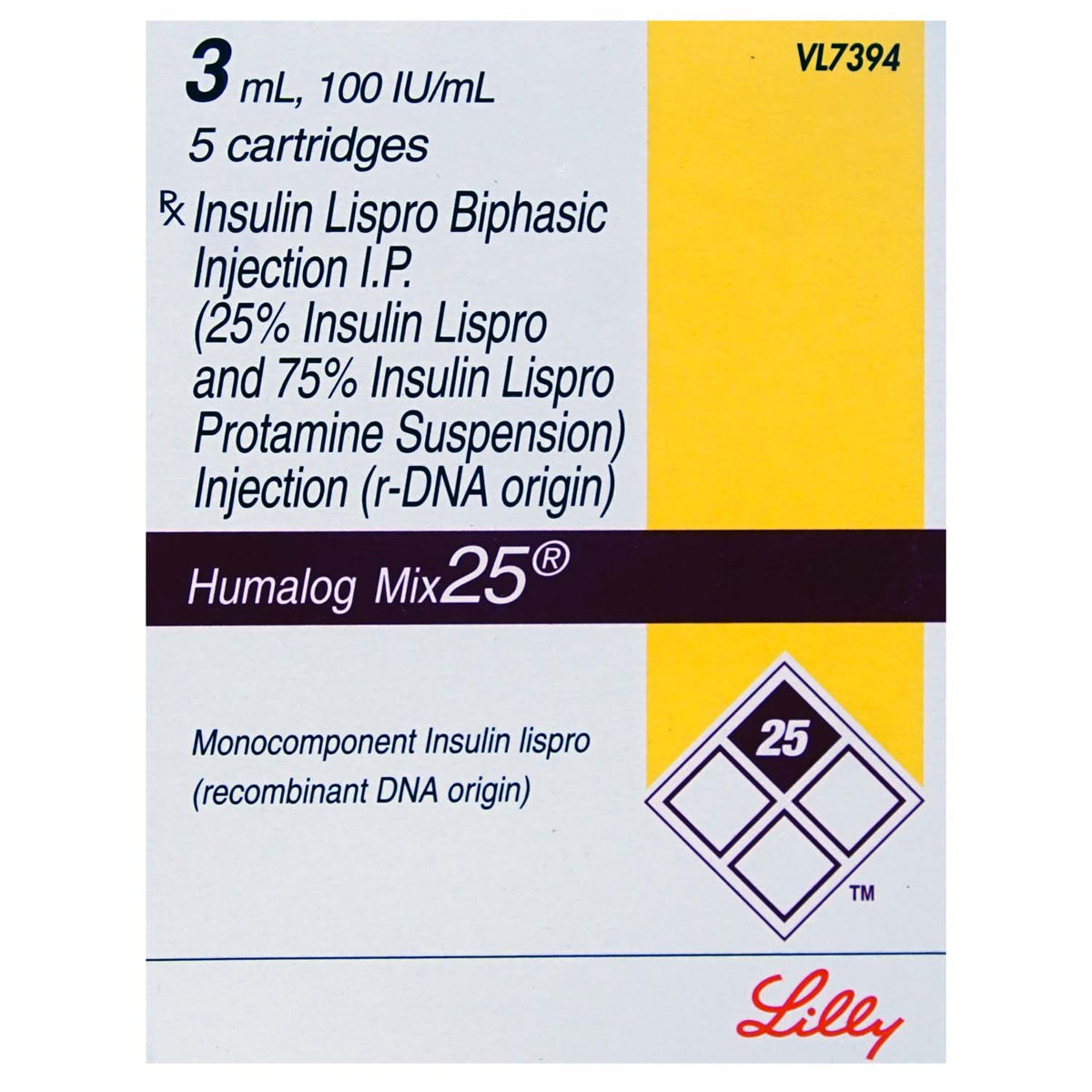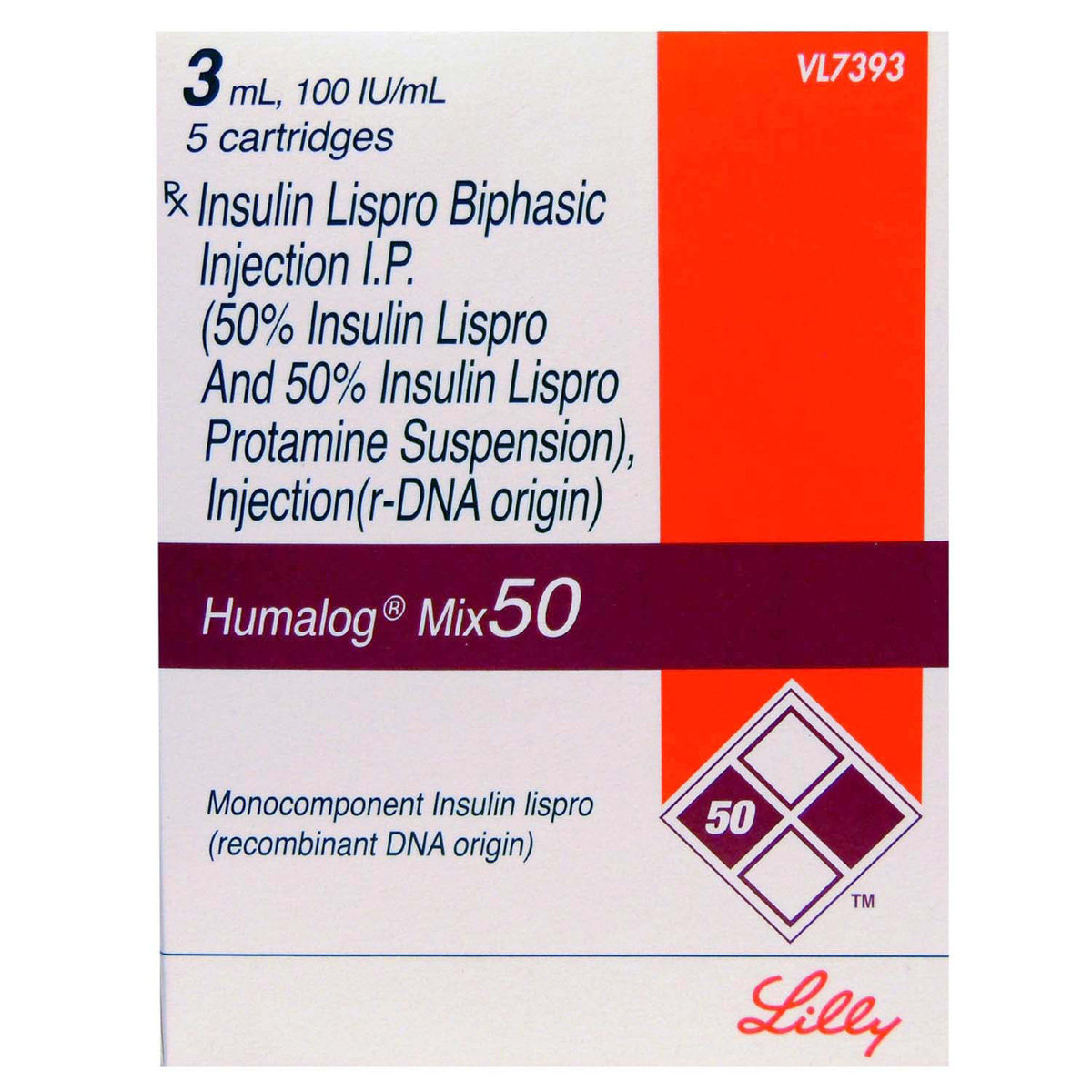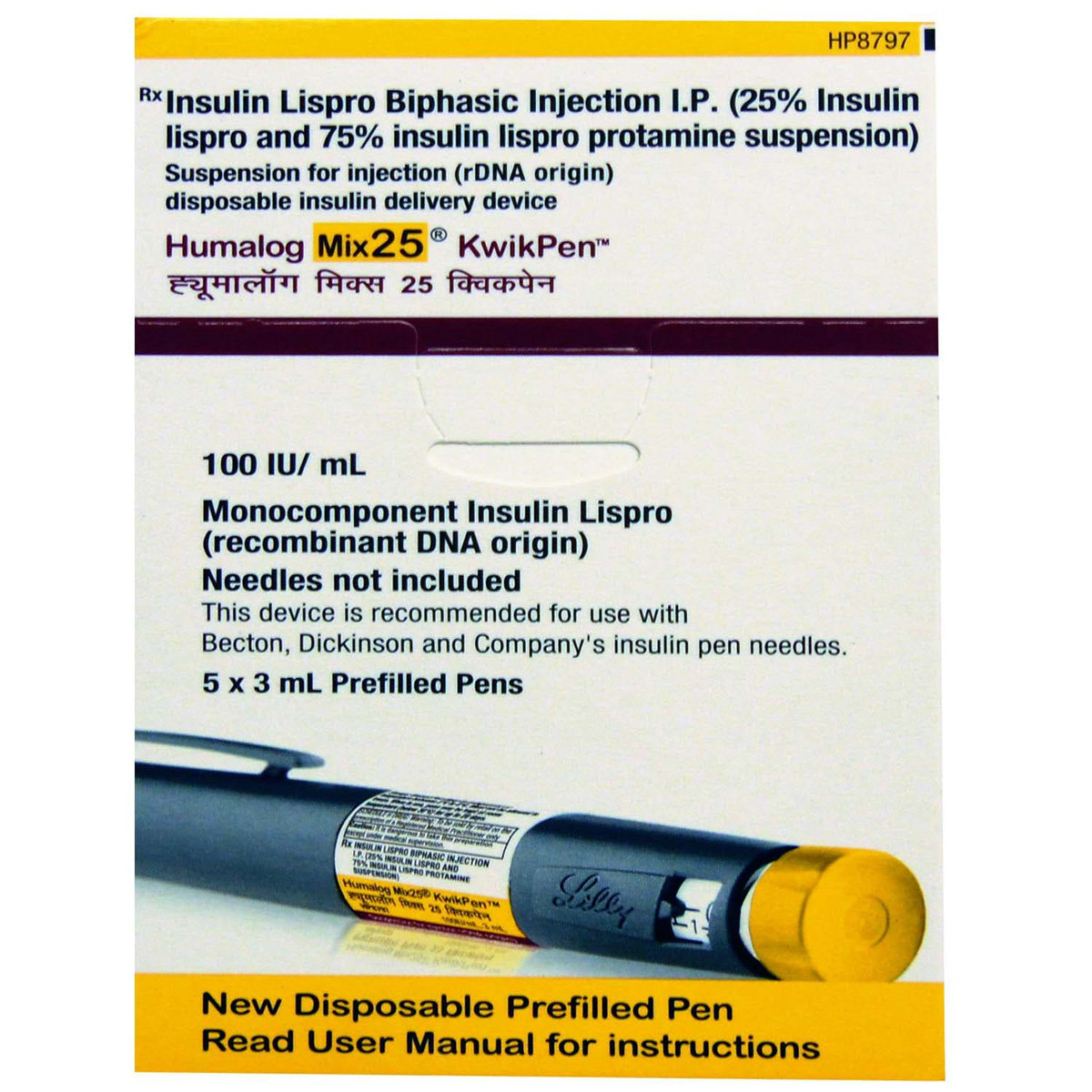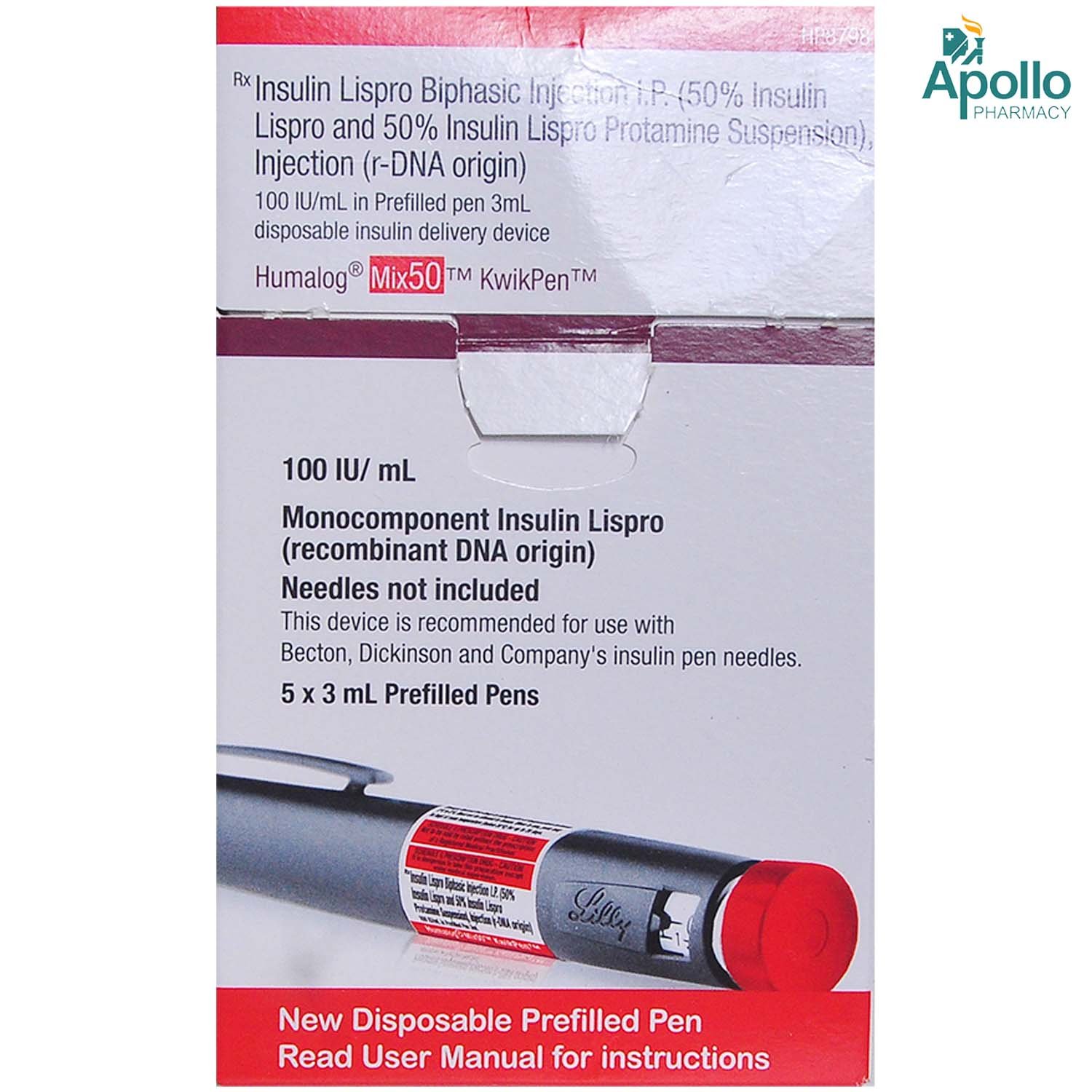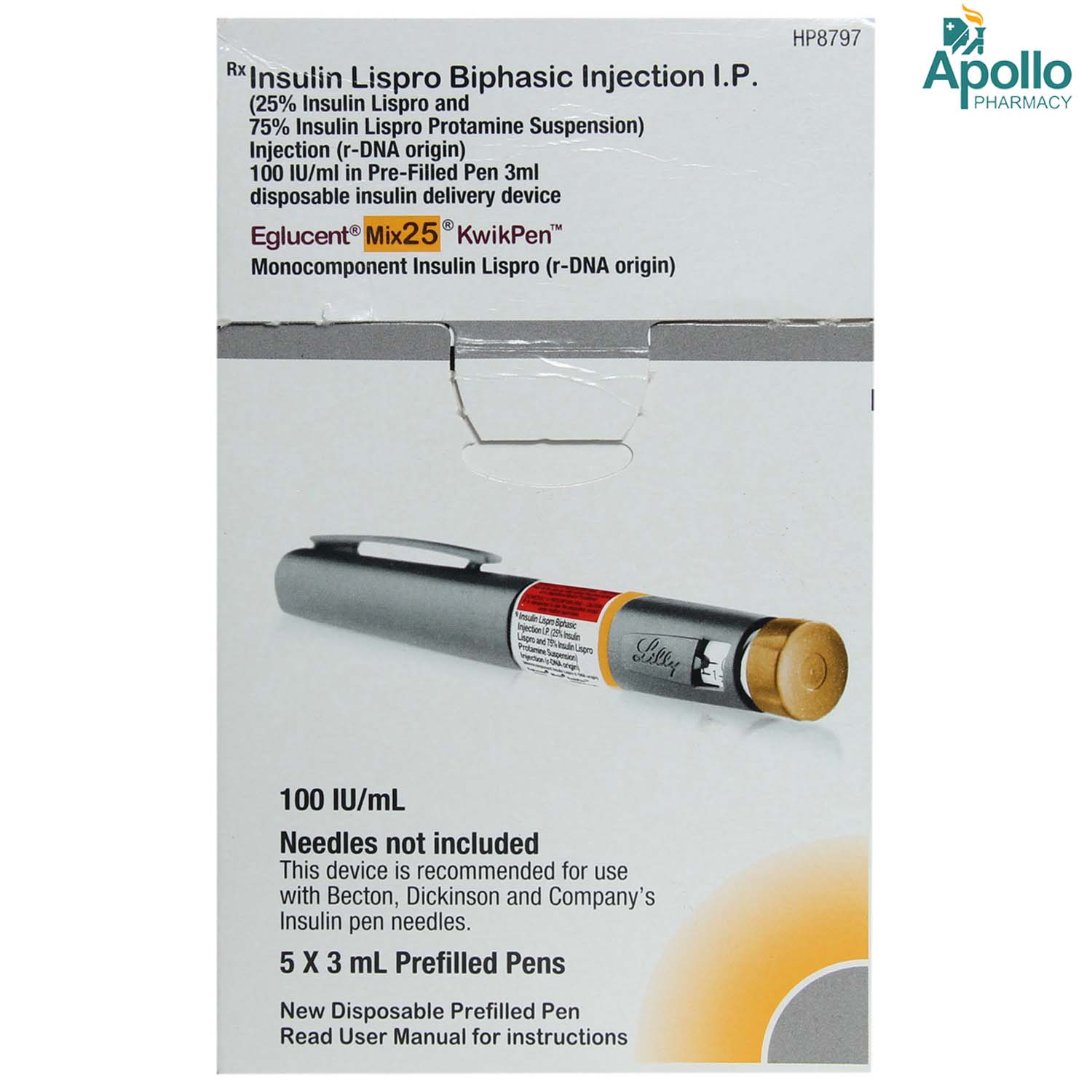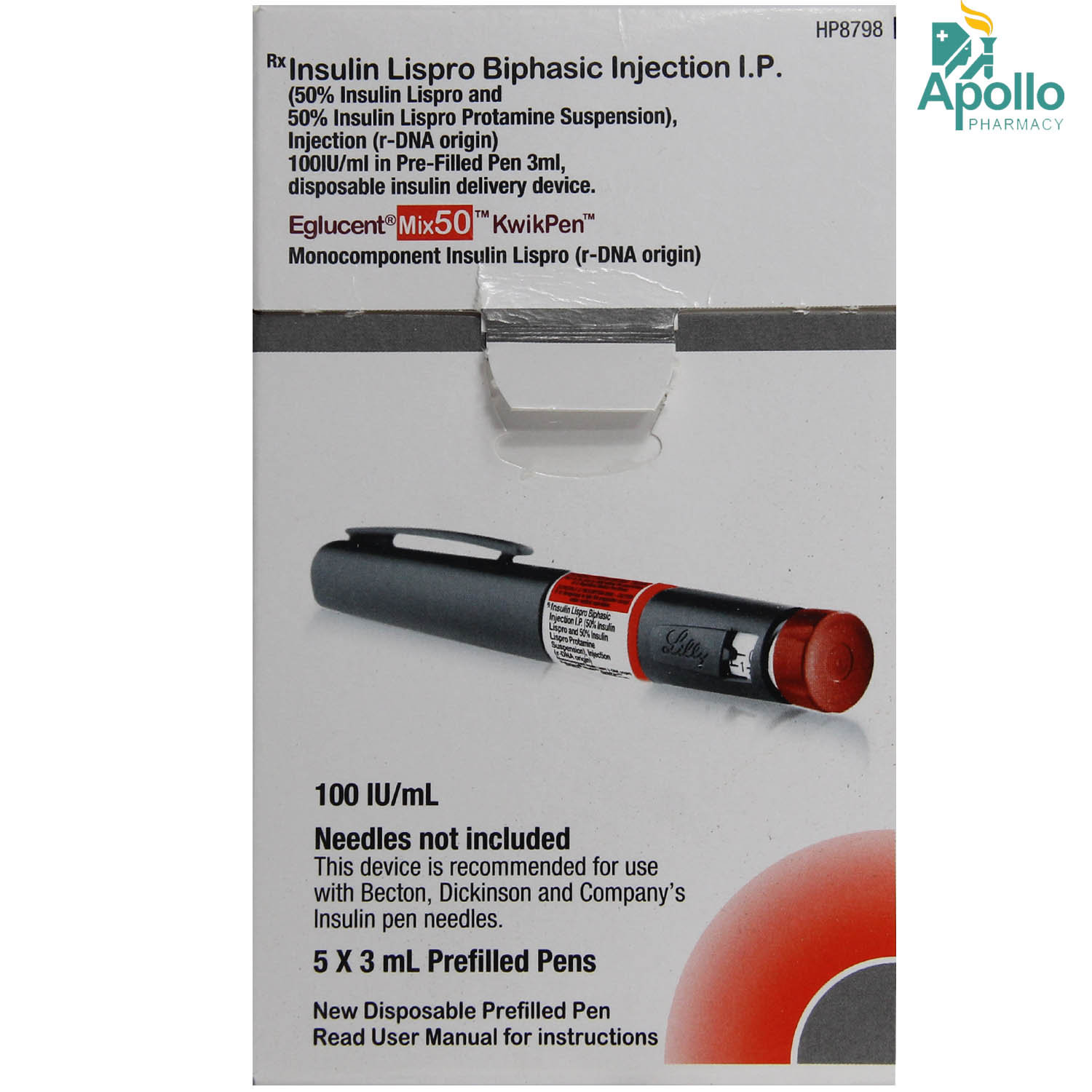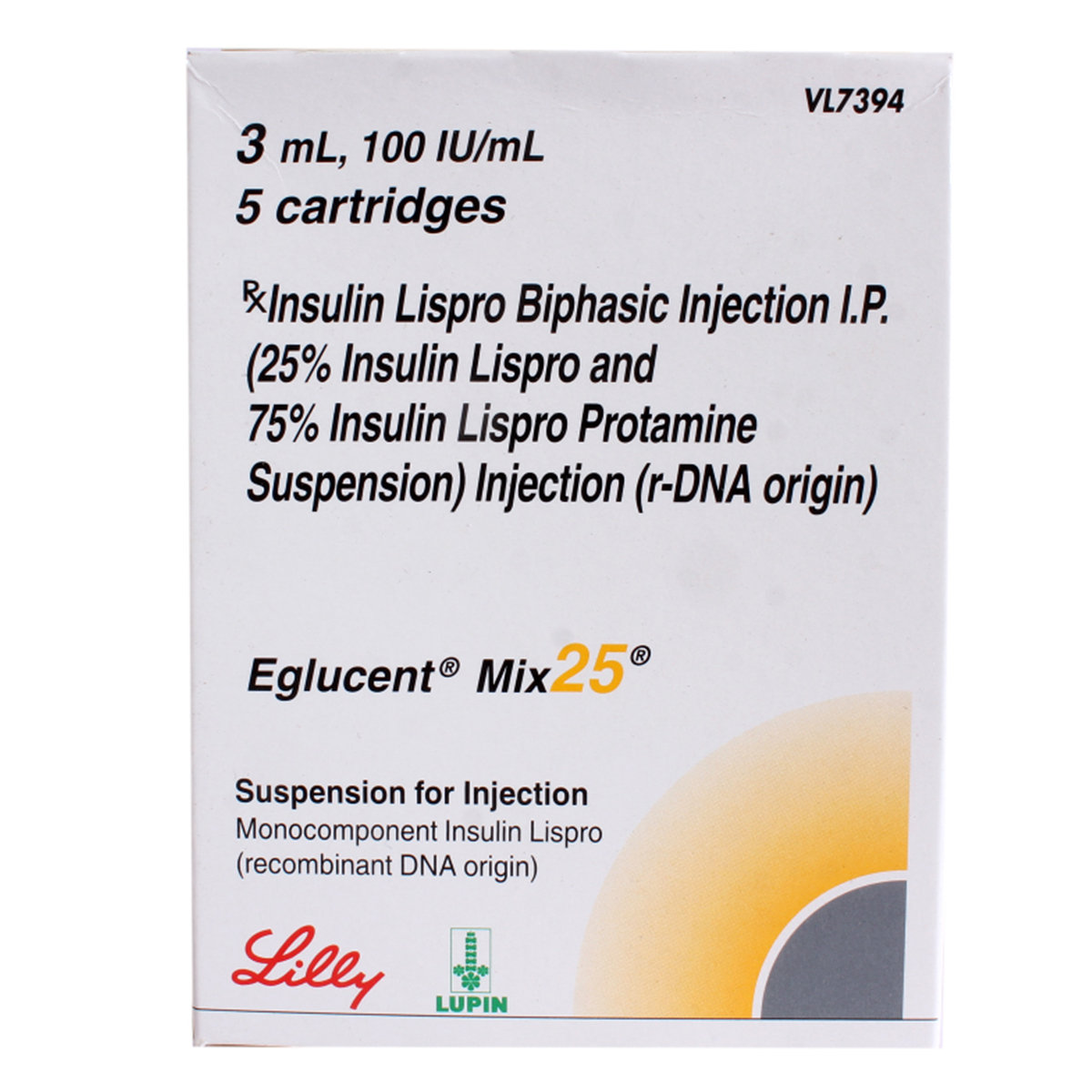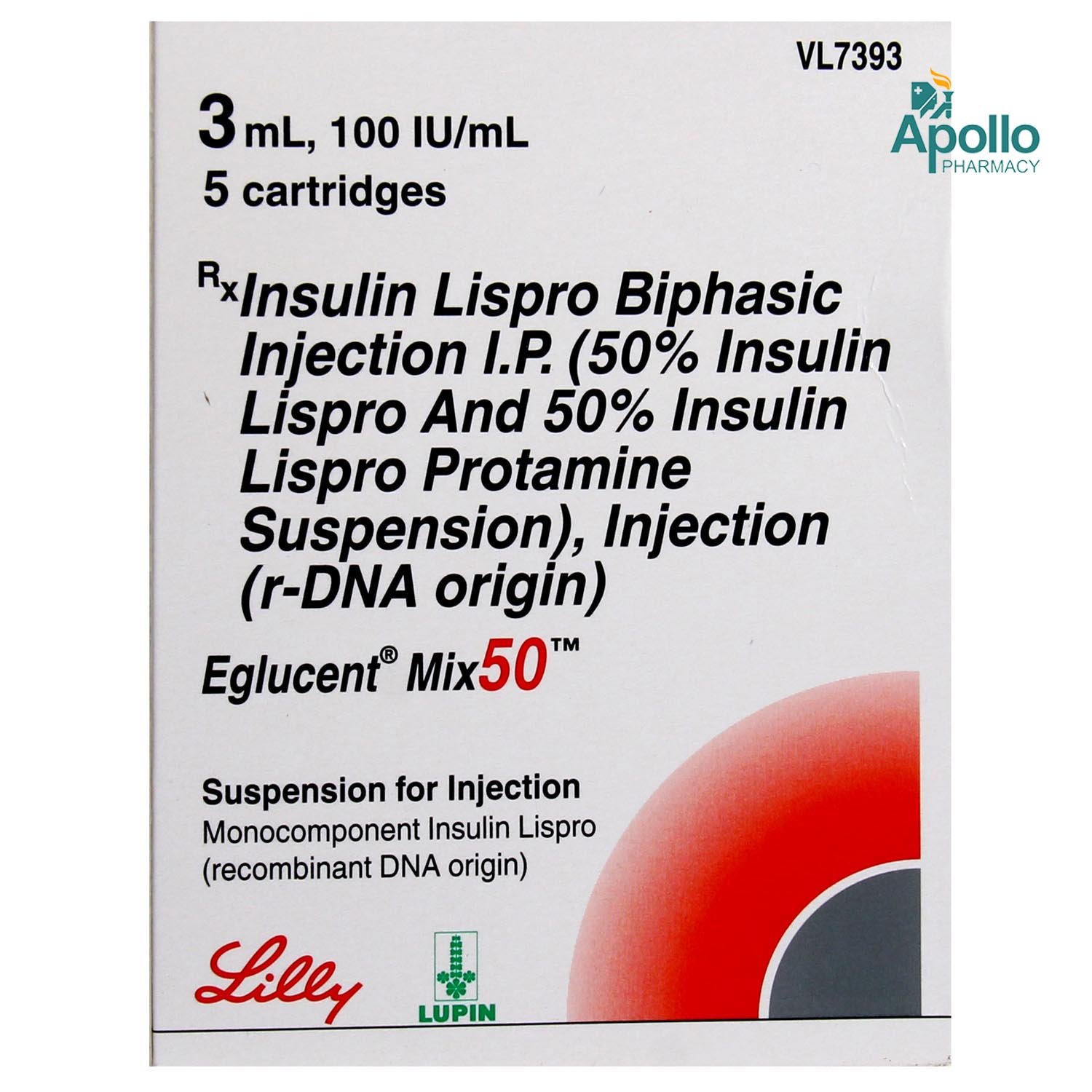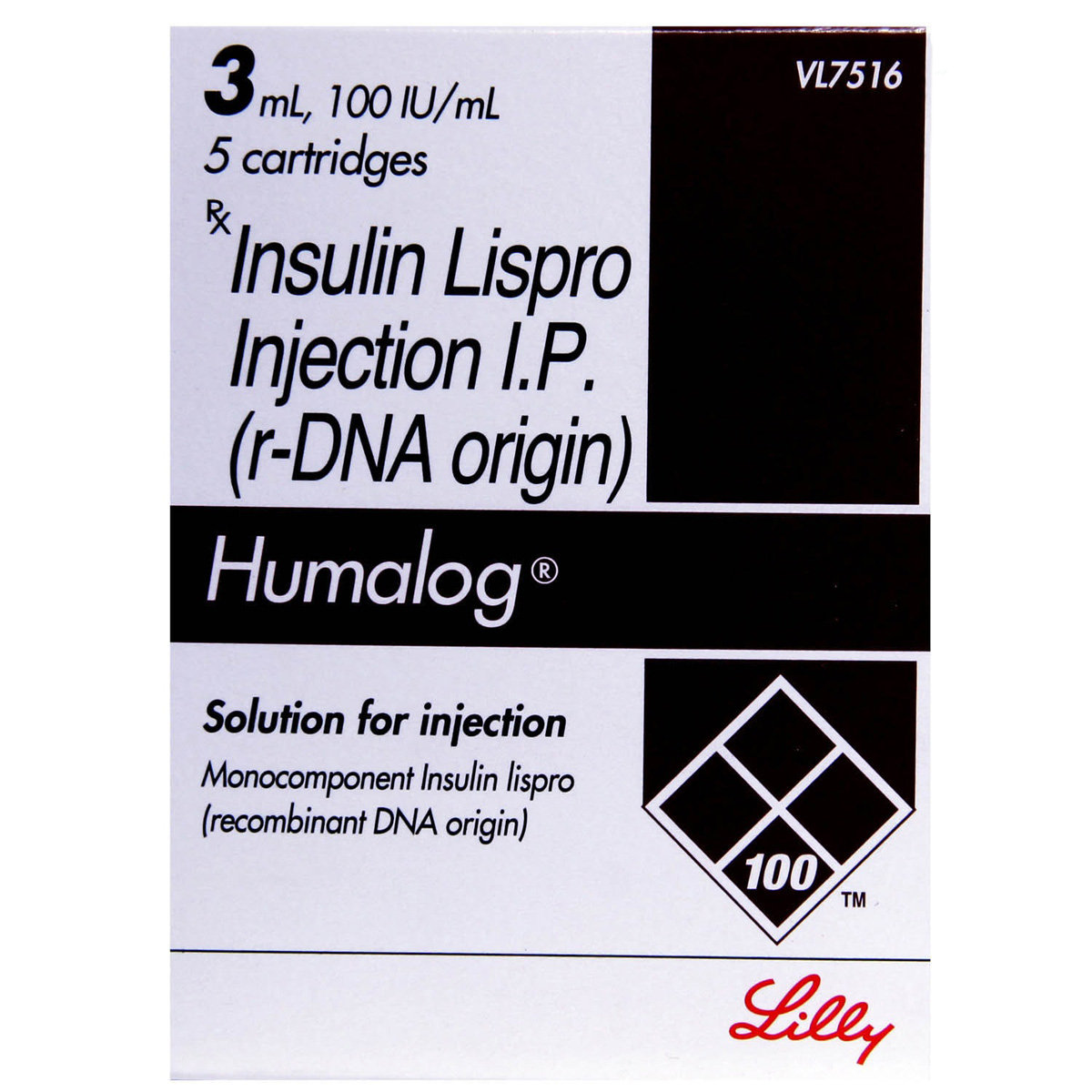Insulin Human+insulin Lispro
About Insulin Human+insulin Lispro
Insulin Human+insulin Lispro belongs to the class of medications called ‘antidiabetics’ primarily used for the treatment of both type 1 and type 2 diabetes mellitus. It maintains blood sugar levels in adults and children. In Diabetes Mellitus Type 1, the body does not produce enough insulin to regulate blood sugar levels. On the other hand, in Diabetes Mellitus type 2, either the body stops producing enough insulin (a hormone that helps lower blood sugar levels), or there is resistance to insulin action. As a result, insulin is produced in large quantities, but it is not capable of operating on the organs of the body.
Insulin Human+insulin Lispro is a combination of two drugs, namely; Insulin human and Insulin lispro.
Your doctor will advise you on how to use the Insulin Human+insulin Lispro. It should be administered at least 5-10 minutes before the meal or within 20 minutes after you start having a meal. In some cases, you may experience injection site reactions like redness or swelling, some people gain weight while taking insulin, hypoglycemia low blood sugar) such as cold sweat, cool pale skin, nervousness or tremor, anxious feeling, unusual tiredness or weakness, confusion, difficulty in concentration, drowsiness, excessive hunger, temporary vision changes, headache, nausea, and palpitation (very high heartbeat). Most of these side effects of Insulin Human+insulin Lispro do not require medical attention and gradually resolve over time. However, if the side effects are persistent, reach out to your doctor.
Try not to stop taking Insulin Human+insulin Lispro of your own. Let your doctor know about this, as it may cause withdrawal symptoms. Do not take Insulin Human+insulin Lispro if you have any low blood glucose levels, kidney, liver, or heart problems, or problems with alcohol or other prescription recreational drugs. Along with Insulin Human+insulin Lispro, you should take a healthy diet, do regular exercise, and maintain weight as advised by your doctor. Insulin Human+insulin Lispro is a cold chain medicine, and so it has to be stored in the refrigerator between 2-8 degrees Celsius else its efficiency might get lost. Do not store it in the freezer.
Uses of Insulin Human+insulin Lispro
Medicinal Benefits
Insulin Human+insulin Lispro is a combination of two drugs, namely; Insulin human and Insulin lispro that works by ensuring rapid and consistent sugar control. Insulin Human+insulin Lispro is a fast-acting form of insulin that helps lower blood sugar levels after the intake of meals. It stimulates the recovery of sugar in muscle and fat cells and thus suppresses the production of sugar in the liver. It prevents the chances of developing serious complications of diabetes. Besides this, Insulin Human+insulin Lispro can be safely prescribed to the diabetic mother in the pregnancy as well as the lactation stage. Insulin Human+insulin Lispro helps in improving the glycaemic control which in turn decreases the risk of progression of complications of diabetes like damage to the retina (retinopathy), damage to the kidney (nephropathy), damage of nerve cells (neuropathy), delayed wound healing, diabetic foot ulcer, and others.
Directions for Use
Storage
Side Effects of Insulin Human+insulin Lispro
- Hypoglycaemia (low blood sugar level)
- Local injection site reactions
- Hypokalaemia (low potassium)
- Lipodystrophy (fat deposition under the skin)
- Rash
- Pruritus (itchy skin)
Drug Warnings
If you are changing the insulin brand or if you need to inject your insulin by another method, it should be done under strict medical supervision. Hyperglycemia symptoms (high blood sugar level) may include symptoms like excessive thirst, dry mouth, increased frequency of urination, nausea, vomiting, drowsiness, flushed dry skin, loss of appetite, and acetone odour of the breath. You should closely monitor these symptoms. Symptoms like heart failure, weight gain, and oedema (fluid deposition in tissue) should not be overruled. Cases of heart failure have been reported when pioglitazone was used with insulin, especially in patients at high risk of cardiac heart failure. It is advisable not to consume alcohol as it may either increase or decrease your blood glucose level. Care should be taken while travelling across more than two time zones. Your doctor may adjust your insulin schedule. Insulin Human+insulin Lispro may decrease the level of potassium, leading to a state of hypokalaemia that, if left untreated, may lead to respiratory paralysis, irregular heartbeat rhythm, coma, and even death. Do not take Insulin Human+insulin Lispro if you have any low blood glucose levels (hypoglycaemia), kidney, liver, or heart problems, or problems with alcohol or other prescription recreational drugs.
Drug Interactions
Drug-Drug Interaction: Insulin Human+insulin Lispro may have an interaction with drugs including antidiabetic or blood sugar enhancing pills (glucagon, glipizide, metformin, sitagliptin, canagliflozin), blood pressure-lowering medicines (metoprolol, hydrochlorothiazide), anti-depressants (fluoxetine, lithium, phenelzine, iproniazid, isocarboxazid, nialamide, imipramine, desipramine, tranylcypromine, moclobemide), antipsychotic (propoxyphene, phenothiazines), blood-thinners (warfarin, dipyridamole, and phenprocoumon), female sex hormones (progestogen, oestrogen), thyroid hormones (levothyroxine), anti-asthmatics (albuterol, epinephrine, terbutaline), lipid-lowering pills (reserpine, niacin, clonidine, fenofibrate, guanethidine), pain killers (aspirin).
Drug-Food Interaction: Insulin Human+insulin Lispro may interact with an ayurvedic, homoeopathy, Unani, herbal supplements, or OTC items. Tell your doctor if you are using these products. Try to avoid alcoholic beverages with Insulin Human+insulin Lispro as it may increase or decrease your blood sugar level.
Drug-Disease Interaction: Insulin Human+insulin Lispro should not be given to patients with kidney disease, liver disease, low blood sugar/glucose level (hypoglycemia), and low potassium level (hypokalaemia).
Drug-Drug Interactions Checker List:
Safety Advice

Alcohol
unsafeYou are recommended not to consume alcohol along with Insulin Human+insulin Lispro to avoid unpleasant side-effects. Alcohol may either decrease or increase the blood sugar level which can be fatal.

Pregnancy
safe if prescribedPlease inform your doctor if you are pregnant as a dose adjustment may be required. The amount of insulin you need usually falls during the first three months of pregnancy and increases for the remaining six months. If you are breast-feeding, you may need to alter your insulin intake or diet.

Breast Feeding
safe if prescribedInsulin Human+insulin Lispro can be given safely to nursing mothers but only under the supervision of a physician.

Driving
cautionDrive with caution, Insulin Human+insulin Lispro usually causes drowsiness and affects driving ability. Your ability to concentrate and react may be reduced if you have hypoglycemia (low blood sugar).

Liver
cautionInsulin Human+insulin Lispro to be taken with caution, especially if you have a history of liver diseases/conditions. The dose may have to be adjusted by your doctor.

Kidney
cautionInsulin Human+insulin Lispro to be taken with caution, especially if you have a history of kidney diseases/conditions. The dose may have to be adjusted by your doctor.

Children
safe if prescribedInsulin Human+insulin Lispro can be given safely to children provided; dose has to be prescribed by a child specialist.
Habit Forming
Diet & Lifestyle Advise
- Exercise may lower your body’s need for insulin during and for some time after the physical activity.
- Exercise may also speed up the effect of an insulin dose, especially if the exercise involves the area of the injection site (for example, the leg should not be used for injection just before running).
- Discuss with your doctor how you should adjust your insulin regimen to accommodate exercise.
- Avoid eating sugar food and prefer food cooked food low in calories.
- When travelling across more than 2 time zones, you should talk to your doctor concerning adjustments in your insulin schedule.
Special Advise
- Your doctor may tell you to have a regular potassium level as prolonged administration causes a life-threatening hypokalaemia condition (low potassium).
- You should normally inject Insulin Human+insulin Lispro within 15 minutes of a meal.
- Always use a new sterile needle for each injection. You or the other person can get a serious infection on changing change the needle.
- Administer Insulin Human+insulin Lispro by intravenous (IV) infusion after dilution and under medical supervision only.
Patients Concern
Disease/Condition Glossary
Type 1 diabetes mellitus: In type 1 diabetes mellitus, our body does not make insulin (the hormone which helps to decrease sugar levels in the blood) to control blood sugar levels.
Type 2 diabetes mellitus: In type 2 diabetes mellitus, either the body stops producing enough insulin, or there is resistance to the action of insulin. As a result, insulin is produced in sufficient amounts but is unable to act on the tissues of the organs.
FAQs
If you experience low blood sugar, eat glucose tablets, or another high sugar snack (e.g. sweets, biscuits, fruit juice). Measure your blood sugar if possible and rest. Always carry glucose tablets or high sugar snacks with you. You should give a call to any of your family members if you are feeling dizziness or drowsiness.
you should inform your doctor before travelling specially when travelling to a different time zone as a dose adjustment may be required.
Insulin Human+insulin Lispro should be avoided in patients who are allergic to any of the components or excipients of this medicine. It should be avoided in patients suffering from moderate to severe kidney disease or liver disease. It is also not advised to use this drug if you drink too much alcohol. Make sure to inform your health care professional if you are pregnant or breastfeeding.
Hypoglycemia refers to low blood sugar levels. Insulin Human+insulin Lispro can cause hypoglycemia. The symptoms of hypoglycemia include nausea, headache, irritability, hunger, sweating, dizziness, fast heart rate, and feeling anxious or shaky. Hypoglycemia can occur if you miss or delay your food, drink alcohol, over-exercise, or take other antidiabetic medicine along with this medicine. Therefore, it is important to regularly monitor blood sugar levels. People with diabetes are advised to keep a quick source of sugar like glucose tablets, chocolate, glucose biscuits, honey, or fruit juice with them. If you experience any of the symptoms of hypoglycemia, inform your health care professional who may then adjust the dose of the medicine to better suit your needs.
In some cases, Insulin Human+insulin Lispro can lower the level of potassium leading to a state of hypokalaemia. In this case, you may feel dizziness, thirst, and general weakness. So, it is advisable to have regular blood sugar and potassium level check-up regularly.

